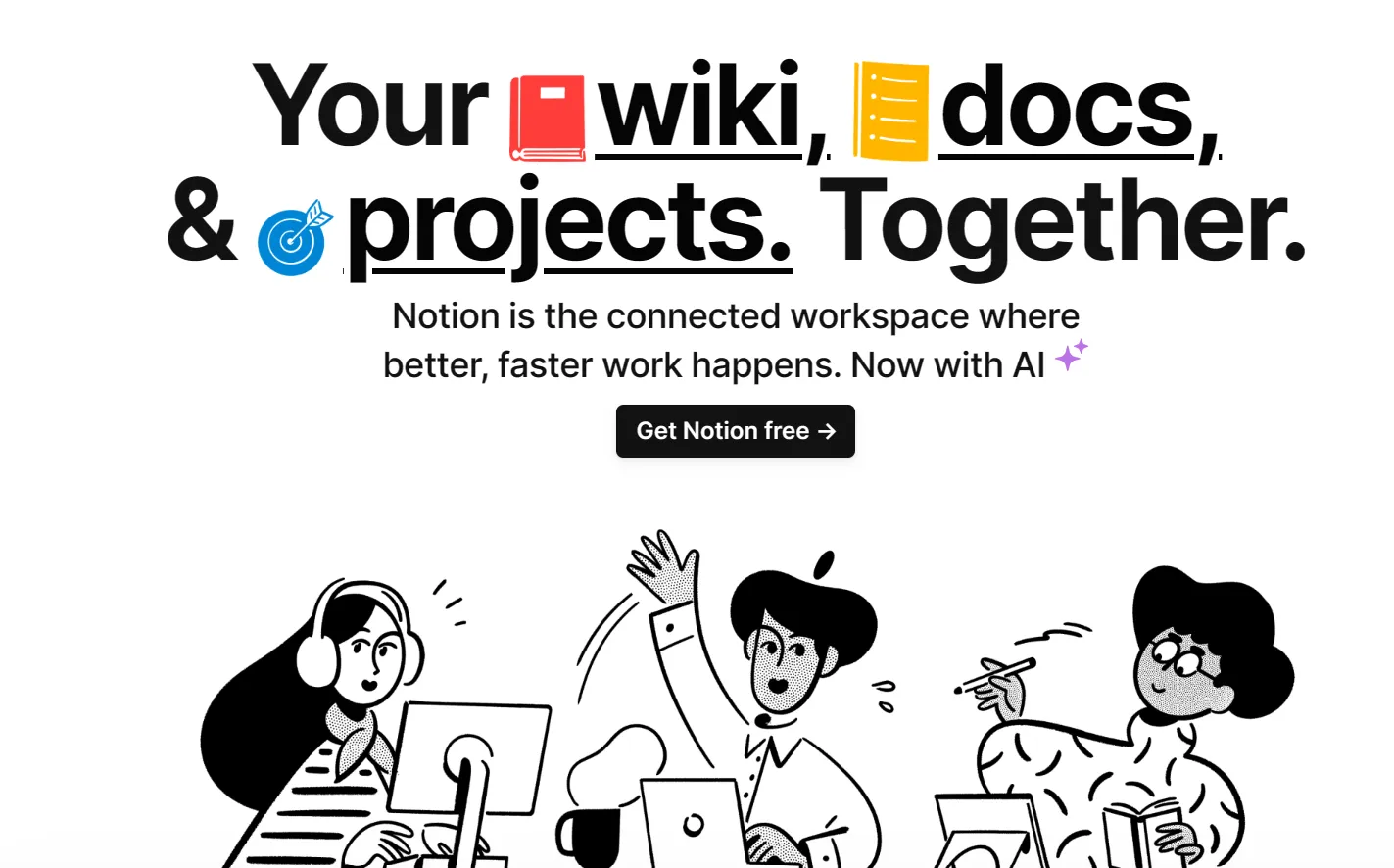Discover the power of Notion, an all-in-one productivity tool that offers unparalleled flexibility, customization, and real-time collaboration. Notion is one of those tools you don’t remember how or when you started using, but you can’t imagine getting by without it. Notion has revolutionized the productivity software landscape with its adaptability and user-centric design philosophy. This adaptability empowers you to streamline your tasks or manage complex collaborative projects, as Notion’s versatile toolkit morphs to align precisely with your unique workflow requirements, providing a competitive advantage in managing your productivity. This review will explore Notion’s key strengths and weaknesses, compare it to other productivity tools, and highlight the standout features that make it a top choice for many.
One of the best things about Notion is that they offer a completely free plan that is unlimited in time and doesn’t even require a credit card to signup. Check out Notion by yourself; it’s free.
Personal Experience with Notion: My Own Belief

Having used Notion extensively for both personal and professional purposes, I’ve found it to be an incredibly versatile tool that aligns with my own belief in the importance of adaptable and efficient workflows. For instance, I’ve used it to manage my personal projects, collaborate with my team on work-related tasks, and even organize my research for this review, all while keeping in mind the ideas formed in my own head about productivity and organization. Here are some of the key advantages:
- Flexibility and Customization: Notion allows you to create highly tailored pages and structures using customizable blocks. Mix and match text, images, code, tables, and more to suit your needs.
- Comprehensive Ecosystem Integration: Notion’s extensive API and native connections seamlessly link with various productivity tools, transforming it into a centralized command center for professional and personal workflows. This comprehensive ecosystem provides a secure and reliable platform for all your productivity needs.
- Versatile Templates: The platform offers a vast library of templates that provide a starting point for various projects, from personal journaling to complex business workflows.
- Seamless Real-Time Collaboration: Notion’s synchronous editing capabilities enable multiple team members to co-create and refine content simultaneously, fostering dynamic collaboration and significantly boosting collective productivity.
However, Notion is not without its drawbacks: Reform Efforts

- Steep Learning Curve: Learning Notion’s various features and customization options require a significant time investment.
- However, Notion has its Drawbacks. For instance, it can become sluggish when handling large amounts of data, which may concern data-heavy users who have the least idea about optimizing performance. If you’re working with extensive databases or complex projects, you might experience some delays or performance issues that leave your competitive advantage potentially threatened.
- Another potential drawback is the limited offline access. While Notion does offer some offline capabilities, its functionality could be improved compared to other tools. For example, you can view and edit your existing pages offline, but you might not be able to create new pages or access certain features without an internet connection.
Comparison to Other Productivity Tools in a Broader Sense
Notion stands out in several key areas when compared to other productivity tools in a broader sense:
- Robust Integration Ecosystem: Notion’s seamless compatibility with diverse third-party tools transforms it into a powerful central hub for project management, knowledge sharing, and productivity enhancement.
- Unique Combination of Features: Notion combines versatile templates, AI functionality, and real-time collaboration in one package, offering a unique value proposition. This unique combination is sure to intrigue productivity enthusiasts and collaborative teams alike.
Notion’s steep learning curve and performance issues with large data sets may make it less appealing for users who prioritize simplicity and speed. The answer largely depends on the user’s specific needs and how they weigh the importance of advanced features versus ease of use.
Key Features of Notion
All-in-One Platform
Note-Taking: Capture ideas, meeting notes, and more with ease. Such a notion of seamless note-taking can revolutionize your workflow.
Create to-do lists and manage tasks efficiently.
Project Management: Plan and track projects with various views (Kanban, calendar, list).
Databases and Wikis: Organize and store information in customizable structures.
Customizable Blocks
- Mix and match block types like text, images, code, tables, and more to create tailored pages.
Extensive Template Ecosystem
Leverage a comprehensive collection of pre-designed templates spanning personal, professional, and industry-specific use cases:
- Personal: Journaling, habit tracking, goal setting
- Professional: Project management, meeting notes, employee onboarding
- Industry-specific: Marketing campaigns, software development sprints, research documentation. Customize and adapt templates to fit your unique needs, or use them as inspiration to create your tailored solutions.
Hierarchical Structure
- Organize and navigate through information effortlessly with Notion’s page-based system.
Powerful Databases
- Create custom structures for storing and managing data with powerful database functionalities.
- Linked Databases to connect related information across different pages.
Real-Time Collaboration
- Work simultaneously with multiple users on the same document, allowing teams to simultaneously pursue public safety and other collaborative goals.
- Permission Control to share pages and databases with specific people and set permissions.
- Comments and Mentions for effective communication within the platform.
Clean Interface
- Enjoy a visually pleasing and intuitive design.
Customization Options
- Personalize your workspace with themes, colors, and icons.
Seamless Integration and Data Portability for Competitive Advantage
- Powerful Developer API: Build custom integrations and applications.
- Automate complex workflows across multiple platforms.
- Access and manipulate Notion data programmatically.
- Flexible Data Exchange: Import data from various formats (CSV, HTML, Markdown).
- Export content to industry-standard file types. Seamless migration tools for popular productivity platforms.
- Open Ecosystem: Connect with popular third-party services via native integrations.
- Leverage community-created plugins and extensions.
- Participate in a vibrant developer community for support and inspiration, much like the state’s attorney’s office strives to balance public safety with justice through ongoing reform efforts.
Final Words
In summary, Notion is a powerful and versatile tool that excels in flexibility, customization, and integration, making it a great choice for productivity enthusiasts and collaborative teams. However, its steep learning curve, performance issues with large data sets, and limited offline access may pose challenges for some users, much like the complexities surrounding the global gay identity.
For those willing to invest the time to learn and customize it, Notion offers a unique combination of features that can significantly enhance productivity and organization, avoiding the pitfalls of radical chic by focusing on genuine utility rather than superficial appeal. If you’re ready to take your productivity to the next level, we encourage you to try Notion and experience its capabilities firsthand.
























